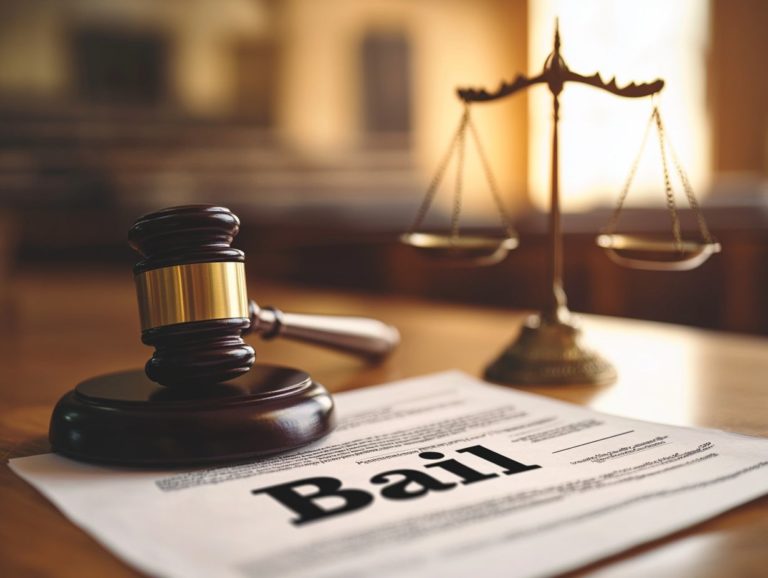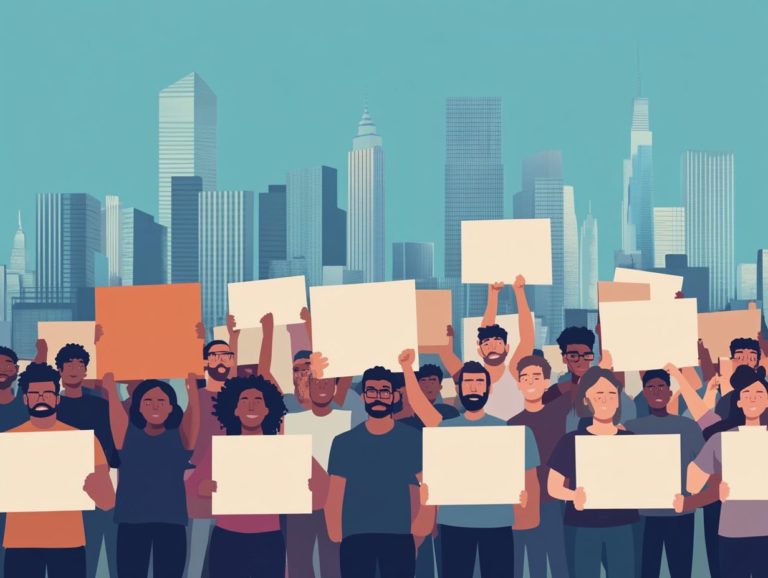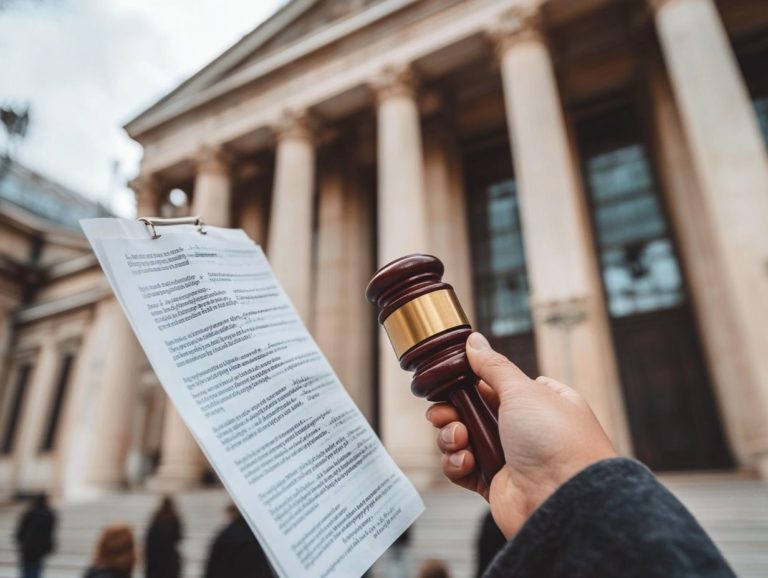Your Rights and Mental Health in Legal Cases
Are you aware of your rights when it comes to mental health in legal matters? Navigating the legal system can indeed feel overwhelming, particularly for individuals grappling with mental health challenges. Understanding your rights is essential; it empowers you to advocate for yourself and seek the support you truly need.
This article delves into the intersection of mental health and legal rights, illuminating how mental health issues can influence legal cases and the specific rights that are afforded to those affected.
You ll discover available resources, the importance of self-care during legal proceedings, and options for legal assistance.
Join in as we unpack these crucial topics, equipping you to navigate the complexities of the legal landscape with confidence and clarity.
Contents
- Key Takeaways:
- Understanding Your Rights in Legal Cases
- Mental Health and the Legal System
- Rights of Individuals with Mental Health Issues
- Navigating the Legal System with Mental Health Challenges
- Seeking Legal Help for Mental Health Concerns
- Importance of Self-Care during Legal Proceedings
- Frequently Asked Questions
- 1. What are my rights when it comes to mental health in legal cases?
- 2. Can my mental health condition be used against me in a legal case?
- 3. Do I have the right to refuse medication or treatment during a legal case?
- 4. Can I have a support person with me during legal proceedings?
- 5. What protections are in place for individuals with mental health conditions in the legal system?
- 6. What should I do if I feel my rights have been violated in a legal case due to my mental health?
Key Takeaways:

- Know your legal rights: Learn what protections are available for individuals with mental health issues.
- Understand the impact of mental health on legal cases: Recognize how your mental health can affect your legal situation.
- Seek legal assistance: Explore options for legal help if you are facing discrimination or challenges in the legal system.
Understanding Your Rights in Legal Cases
Understanding your legal rights in matters concerning mental health is essential not just for safeguarding your autonomy. It is also vital for ensuring that due process is followed.
Legal rights, embedded in frameworks like the Americans with Disabilities Act and the U.S. Constitution, are important in protecting your access to mental health services and combating discrimination.
These rights determine what treatment options you have during involuntary commitment or civil commitment proceedings, enabling you to advocate for your psychological autonomy within the healthcare system.
Overview of Legal Rights
Legal rights concerning mental health encompass a range of vital aspects, including privacy rights, informed consent, and the protection of consumer rights within healthcare systems. These rights are designed to make sure that you feel safe and supported when seeking help.
For example, privacy rights protect the sensitive information you share during therapy or treatment, allowing you to engage fully without the anxiety of potential breaches. Informed consent means that healthcare providers must clearly communicate treatment options, enabling you to make well-informed choices about your care.
Various entities uphold this framework, such as the Health Insurance Portability and Accountability Act (HIPAA) in the U.S., which outlines the proper handling of mental health information. This ensures that your rights are respected and that your well-being remains a top priority.
Mental Health and the Legal System
The intersection of mental health and the legal system presents a nuanced landscape where mental health conditions can profoundly impact legal proceedings, especially in criminal justice cases that involve the insanity defense.
Legal standards meticulously outline how mental health is evaluated during trials, including the presumption of competency. This principle assesses an individual’s capacity to comprehend the charges they face and engage meaningfully in their defense.
Understanding this interplay is essential for navigating the complexities of the legal framework surrounding mental health.
Impact of Mental Health on Legal Cases
Mental health can significantly influence legal cases, especially when it comes to employing the insanity defense. This defense hinges on established legal standards that assess a defendant’s mental health status at the time the crime was committed.
To effectively utilize this defense, a comprehensive evaluation of the individual s psychological state is essential. This often entails expert testimony to ascertain whether the defendant possessed the capacity to understand the nature of their actions or to distinguish right from wrong during the commission of the offense.
Such evaluations can lead to diverse legal outcomes, as juries might be swayed by perceived mental instability, ultimately shaping their perspectives on culpability. For defendants diagnosed with mental health conditions, treatment options may include therapy or medication, which can profoundly impact rehabilitation efforts.
Thus, these factors play a crucial role in the post-trial adjudication process.
Rights of Individuals with Mental Health Issues
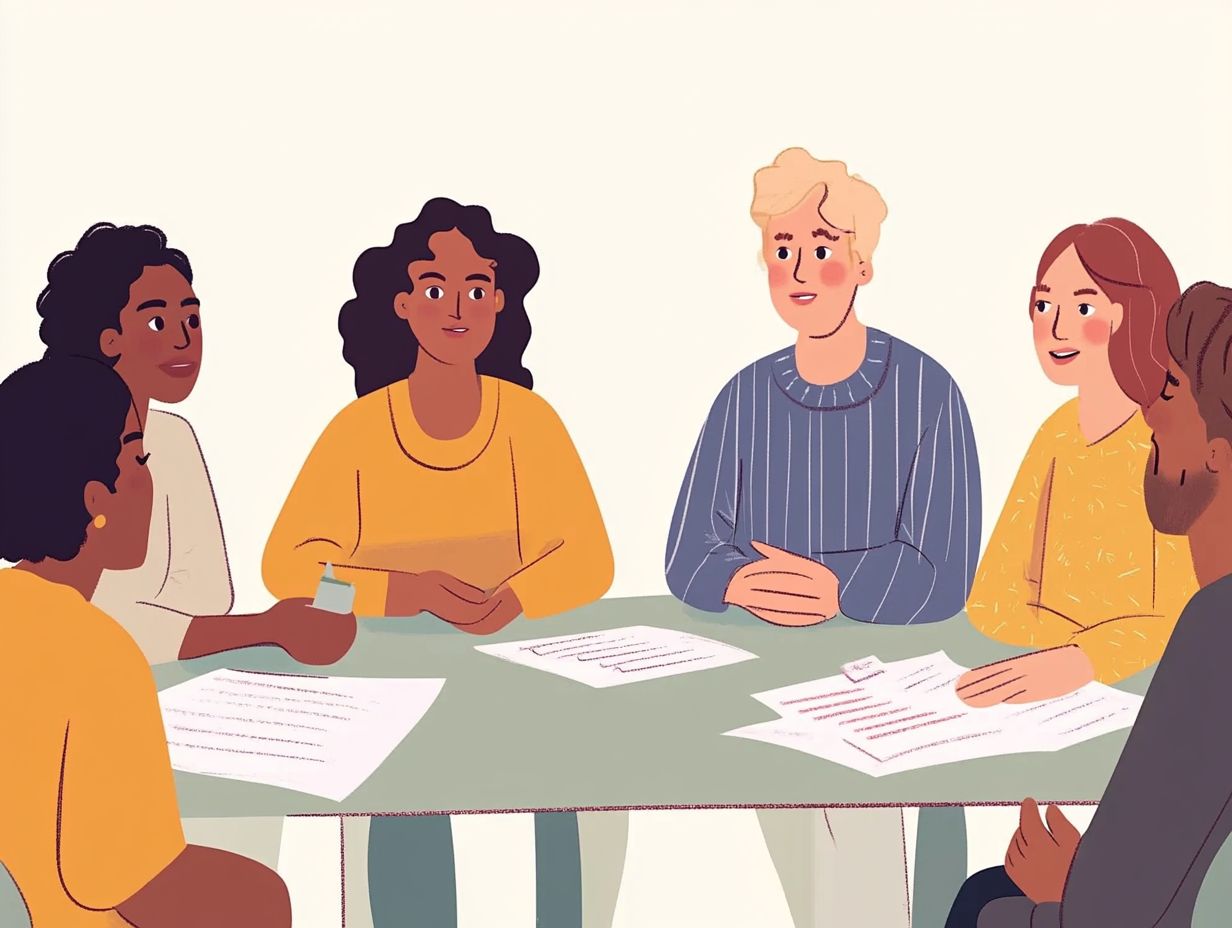
You have specific rights as an individual with mental health issues that shield you from discrimination and foster inclusion in society. It s crucial to recognize the significance of these rights in accessing mental health services and being part of your community.
Among these rights are autonomy rights, which enable you to have a voice in your treatment preferences and recovery services.
Protection Against Discrimination and Stigmatization
Protection against discrimination and stigmatization is a fundamental right for you if you have a mental health condition, backed by laws like the Americans with Disabilities Act. These laws aim to remove barriers and promote equality.
These protections ensure that you can navigate life with dignity. Such legal frameworks do more than just provide safeguards; they enable you to advocate for your rights in various settings, including workplaces and educational institutions.
Advocacy initiatives are vital in dismantling harmful stereotypes about mental health. They encourage open dialogue and engagement within your community.
Raising public awareness is crucial. It helps dispel myths and fosters a more inclusive society where you can seek help without fear of judgment.
Collectively, these efforts contribute to a culture that values mental well-being, ensuring that everyone, including you, has access to the support and respect they rightfully deserve.
Navigating the legal system while facing mental health challenges demands a clear understanding of legal standards and treatment options. This journey can often become complex, particularly when safety concerns and the potential for abuse in treatment settings come into play.
Challenges and Support Available
Individuals facing mental health challenges often encounter barriers that complicate their legal situations. However, a wealth of support services, including peer support and recovery programs, exists to assist you.
Navigating complex legal processes can be overwhelming and disorienting. These challenges often exacerbate mental health issues.
Misunderstandings in communication can lead to unfavorable outcomes in legal matters, making the stakes even higher. Fortunately, various organizations offer community integration initiatives designed to bridge the gap between the legal system and your mental health needs.
- Peer support groups are invaluable, offering understanding and companionship as you navigate these trying times.
- Advocacy programs provide essential resources, ensuring you receive fair representation and access to the legal assistance you need.
Seeking Legal Help for Mental Health Concerns
Seeking legal assistance for mental health concerns is crucial for you to effectively navigate complex systems. This ensures that your treatment options align with your legal rights and are accessible within the healthcare framework.
Options for Legal Assistance
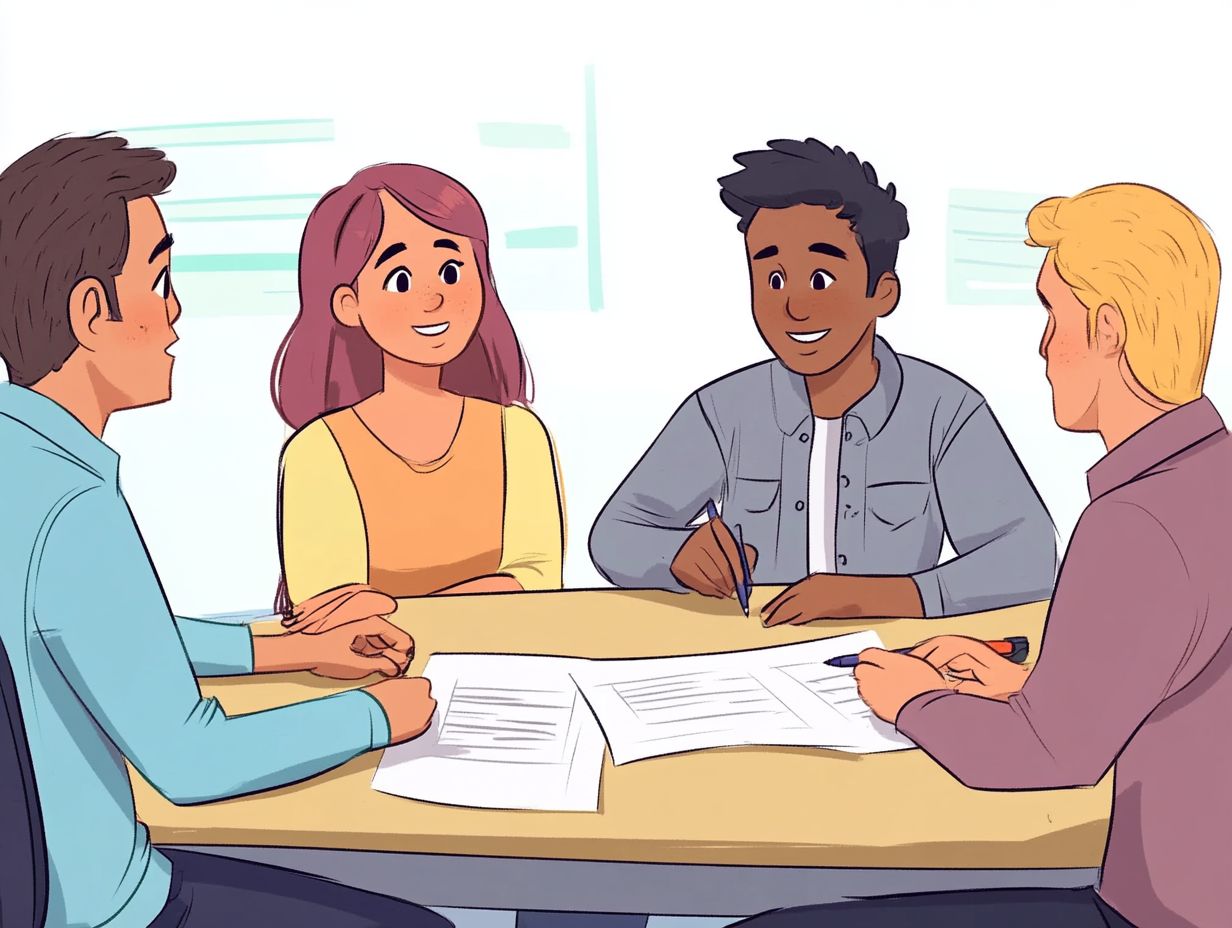
Options for legal assistance in mental health cases encompass advocacy initiatives, legal aid organizations, and laws designed to support you in navigating the complexities of healthcare systems.
These invaluable resources work tirelessly to clarify your rights and options within intricate legal frameworks. For instance, advocacy initiatives often aim to educate you about your entitlements under mental health laws, ensuring that you can access necessary treatment without facing discrimination.
Legal aid organizations provide free legal services, allowing individuals with low income to secure quality representation when dealing with insurers or healthcare providers.
These groups often collaborate with consumer-driven systems to raise public awareness and reform policies, ultimately creating a more supportive environment for those facing mental health challenges.
Importance of Self-Care during Legal Proceedings
The significance of self-care during legal proceedings cannot be overstated. You must prioritize your mental health to effectively navigate the complexities of the legal system.
By doing so, you equip yourself to handle the challenges that arise, allowing for a clearer mind and better decision-making throughout the process.
Tips for Maintaining Mental Health
Maintaining your mental health during challenging legal proceedings is crucial. Use effective self-care strategies and recovery services to support yourself.
Legal disputes can feel overwhelming. Prioritize your mental well-being during these times.
Practice mindfulness techniques like meditation or deep-breathing exercises. These can significantly reduce anxiety and promote emotional balance.
Reach out to peers for support. Trusted friends or support groups can provide community and understanding.
Consider professional help through therapy or counseling. These services offer guidance and coping tools.
These strategies build resilience and pave the way for healthier coping mechanisms.
Frequently Asked Questions
1. What are my rights when it comes to mental health in legal cases?
You have the right to fair treatment without discrimination in legal cases. This includes confidentiality, privacy, and reasonable accommodations for your mental health needs.
2. Can my mental health condition be used against me in a legal case?
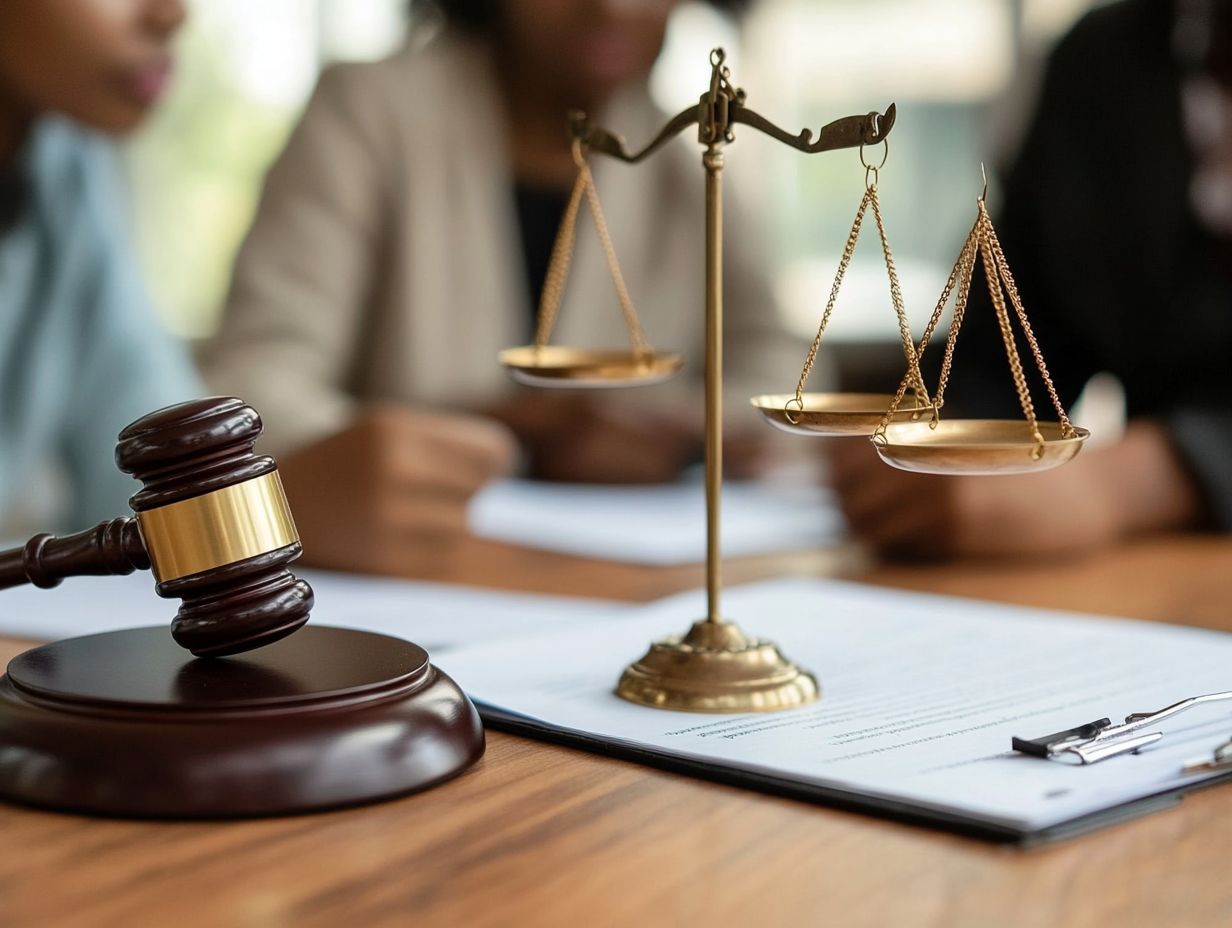
Your mental health condition cannot be used against you in a legal case. Information about your mental health should only be relevant if it directly impacts the case.
3. Do I have the right to refuse medication or treatment during a legal case?
You have the right to refuse medication or treatment during legal proceedings. However, if a judge believes your mental health affects your ability to participate, they may require treatment.
4. Can I have a support person with me during legal proceedings?
You can have a support person during legal proceedings. This could be a family member, friend, or a trained advocate who provides emotional support and helps you understand the process.
5. What protections are in place for individuals with mental health conditions in the legal system?
Protections include the right to a fair trial, access to mental health treatment, and freedom from discrimination based on mental health conditions.
6. What should I do if I feel my rights have been violated in a legal case due to my mental health?
If you believe your rights have been violated, seek help from a lawyer or legal advocate. They can guide you on filing a complaint and protecting your rights.

